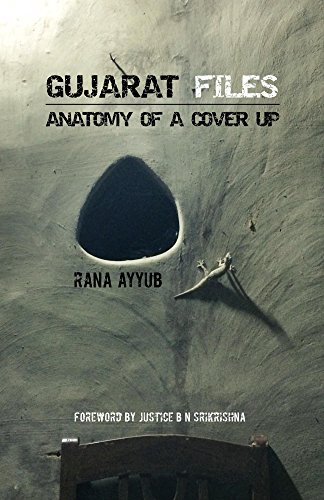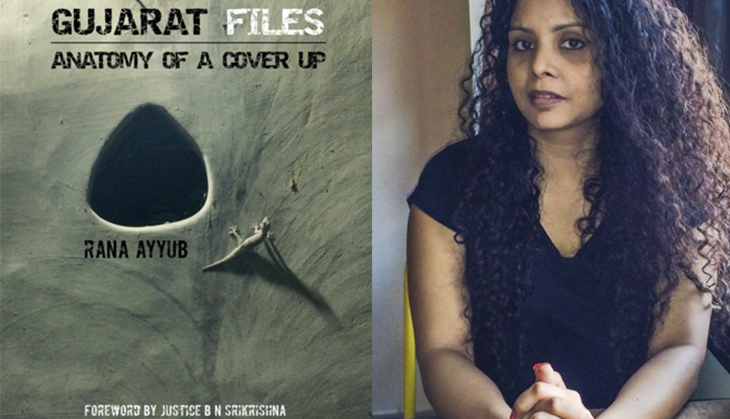
In the aftermath of Allahabad High Court judgement that nullified her election as a MP from Raebareli and in the midst of on growing students’ unrest, also known as Bihar or JP movement, Mrs Indira Gandhi imposed emergency on 25th June 1975 under . Fundamental rights were suspended; political opponents and dissenting intellectuals were jailed, press censored. The pervasive sense of fear, apprehension and the threat to fundamental rights including right to life in the undeclared emergency under Narendra Modi’s regime, is far higher than that. Modi is trying to implement Gujrat model the whole country declared emergency presently Modi regime under constitutional provisions in 1975. The undeclared emergency Gujarat manifesting from Gujarat Files: Anatomy of a Cover Up by Rana Ayyub was more intense, particularly for the dissenting voices. The undeclared emergency under the Modi regime in Gujrat and now in India has been more frightening and scarier. What Indira Gandhi could through constitutional amendments with absolute majority in both the houses, Modi government is doing much more than that without it in complicity with front organizations. The undeclared emergency in Gujrat and now in the whole country has obedient and complying bureaucracy and police on the same pattern with increased gravity of loyalty. She resorted to superstition of Supreme Court judges for a “committed” judiciary, this dispensation seeks to subvert judiciary by extra-constitutional means, for which the government was recently, badly reprimanded. The comparative study Indian fascisms — constitutional and extra constitutional — is beyond the scope of this review article, it is just sought to point out relative gravity the two varieties. While Indira Gandhi used the constitutional provision of emergency to supress the fundamental rights, particularly rights freedom to expression and dissent, the Modi government and RSS are using the extra-constitutional RSS brigades like ABVP and sold out or scared media and misusing draconian colonial sedition laws to silence the dissent. For the suppression of dissent, Indira Gandhi had only state’s coercive apparatuses on her disposal, in addition to that Modi in Gujrat during his chief ministership now in the India, has the additional forces like VHP, Bajrang Dal and the ABVP. After coming to power at the Centre, the series of attacks on the democratic institutions and right of expression are nothing but expanding the fascist terrorism of Gujarat variety to the entire country.
Emboldened by the arrest of Amit Shah, following her expose in Tehelka, the daring young journalist Rana Ayyub decided to achieve the impossible, to explore the truth of Gujrat genocide and the subsequent communal build-up by the RSS fronts and proved that the impossibility is just a theoretical concept. The complicity of the government in post-Godhra Gujarat holocaust in 2002 and subsequent fake encounters for electoral polarisation is a common knowledge. But as the author admits at the very outset, it could not be proved because of lack of solid evidence. “There was an indication that over the last decade there had been subversion of the judicial process. Those who were supposed to safeguard the lives of people had been bought over. From the riots to encounters to political assassinations, many an inconvenient truth was waiting to come out” (Page 9).
With the encouragement from the editors of Tehelka, she ventured out to reveal the ‘covered up’ truth of the Gujrat’s political underworld as an undercover journalist. She disguised as Maithili Tyagi from Kanpur, a student of a US based Film institute. She luckily met a 19 year old French boy, a foreign exchange program student, who agreed to act as her assistant. With full preparation and precautions she began her sting operation. Notwithstanding the great risk involved, she went ahead collecting evidences for eight months with substantial success. At the almost last leg, while waiting a call from Narendra Modi’s office for her second meeting with him, she was asked to halt the investigation and called back by the editors. Echoes of fascist ambience pervading Gujrat had reached Delhi. They ‘politely’ turned down her request to carry the ‘story’ citing Modi’s increasing aura and ability to harm the publication. As Rana recalls her arguments with the editor in her first job over ethics and morality in journalism during her initial days of job in “He gave me a patient ear and then said something which stayed with me: ‘A good journalist should learn the art of detaching herself from a story and be pragmatic. Till this day I regret being unable to master this art, particularly because, very often, it is used as an excuse to kill a story at the behest of corporate and political powers”. (p.X) She removed the undercover and decided to make her findings public, notwithstanding several adversities. The result is, Gujarat Files: Anatomy of a Cover up, an incisive documentation of the rare narratives about premeditated and protracted 2002 program, subsequent continuity at places and unceasing hate campaigns.
While going through the book, a reader, not well acquainted with the recent political history of India and Gujarat, might take it as an interesting detective novel with unfolding of mysteries one after the other. The underworld in it is political and the characters are real and live. The extent and intensity of diffidence, insecurity and pervasive fear under a ruthless and corrupt government can be gauged by the fact that not only the spineless officials, complicit in political crimes of the political bosses but even those known to be honest also remained tight-lipped against injustice, citing helplessness. Rana Ayyub makes these tight-lips to talk. In the disguise of a non-resident Indian filmmaker, she captures their conversations through spy cameras hidden inside her kurta, diary and watch.
Gujarat Files is an account of an undercover investigative journalist’s daring sting operation for eight months into 2002 pogrom and subsequent fake encounters. Posing as a documentary film producer from an American film institute, ‘Maithili’, stings those administrative and police officials who were on important positions in Gujarat during the years 2001 and 2010. The narratives captured by spy cameras contain clear evidences of the complicity of the government and the RSS affiliates in one of the most heinous crimes against humanity. But the Gujarat High Court, which could not see any conspiracy in Gulbarga Society killings in which 69 people including former Congress MP, Ehsan Jafri, is unlikely to take sue-moto cognizance of these evidences. The book also records the confessions of some of the Modi’s staunch supporters that chauvinistic political mobilization by communal polarization created by communal violence paved the way to the political ascendance of Narendra Modi. It is also a vindictive comment on the level of social consciousness in the country, which instead of being furious over the massacre, rapes, arson, plunder and the forced displacement on such an unprecedented scale in the name of action-reaction, a large number of ‘educated’ ones hold its authors in great esteem. This book reveals universally known ‘covered-up’ truths by the narratives of some of the highly placed bureaucrats and the Police officials who knew the truth but had chosen to keep mum before the probe commissions.
Exposure of Machiavellianism
The acquisition, consolidation and expansion of power by chauvinistic political mobilization through the communal violence, hate campaign and misinformation by various RSS groups and fake encounters by Police in Narendra Modi’s regime, as documented in this book, reminds the Renaissance political philosopher, Machiavelli. It gives the feeling of reading a neo-liberal, Indian edition of a political novel renaissance period. For Machiavelli, success in politics, i.e. in acquisition; retention and expansion of power, holds the same place in politics as virtue in ethics. A prudent Prince follows political code of conduct, which he calls ‘the reason of the state’ and not the ethical or religious, while leaving no stone unturned in pretending to be the highest priest of morality and religiosity. Religion for Machiavelli is an effective political instrument. He advises the king that he should not only not disturb the religious practices and traditions but ensure their observance as it keeps people faithful. Moreover fear of God may transcend into the fear of the Prince. RSS and BJP have been thriving on the chauvinistic political mobilization around religious appeals. All the writings are reflection on contemporary conditions but the great writings become classics with universal contemporariness. His book, Prince written in the forced solitude in 1513, is a classic whose depiction of the political authority has remained relevant in subsequent times in changed forms in the changed circumstances of time-space. In action of rulers, “the end justifies the means. Let the Prince therefore aim at conquering and maintaining the state, the means will always be judged honourable and praised by everyone.” The end in politics is power. All the means including treachery, hollow promises, deceit and demagoguery to attain, maintain and extend power are justified. Intellectuals do not create justices-injustices; virtues-vices. They only react to and reflect upon conditions prevalent in the society. The idealist camouflage the unpleasant realities into abstract philosophical jargons and a realist presents is naked, as it is. Machiavelli did not invent political murders, palace coups, treacheries. They were ubiquitous in renaissance monarchies. He just advised the prudent princes to do it magnificently. The political graph of India’s present PM, Narendra Modi is a living testimony of the contemporary relevance of Machiavellian maxims.
Prince is a political code of conduct written in the form of advices to prudent Princes to attain, maintain and expend power, without any consideration to the sanctity of means. Rana Ayyub’s sting operation resulting into Gujrat Files is a vivid exposure of Machiavellian “means” to attain and retain power in Gujrat and extend it to the centre, through communal polarization of society without consideration to moral-immoral and social harmony. Discussion on Machiavellian attributes of Modi or RSS is beyond the scope here and is matter of a separate discussion, the reference is just allude to the neoliberal relevance of Machiavelli’s theory of state craft.
Machiavellian Prince is neither a medieval king ruling with divine mandate nor a dynastic crown Prince. He is a condottieri (a mercenary leader) risen from a humble background like Hitler or Modi, who founds a new state (principality) through conquest, consolidate it and extend. Machiavelli advises the prudent Prince to choose and follow suitable model out of the examples of existing or historical successful princes. He presents one contemporary imitable example with one from the classical times.
He fools everybody and people get fooled
Agathocles was a potter’s son from Sicily, who had migrated to Syracuse in the 4th century BC. Not finding interest in the family occupation, he joined army and subsequently after marrying the widow of his patron, raised his own army. Once he invited all the dignitaries and noted parsons including the senators for a debate on Solon, the lawgiver. His armed soldiers were hiding behind the curtains of the hall and as soon as people entered, they were slain. Agathocles rode in the city as a king and no one was there to oppose.
Machiavelli’s contemporary model Rodrigues Borgias was a cardinal in the Roman Church. He had his own proson, hangman and poisoner. Latter, in particular, was constantly busy. His victims included several cardinals. He manipulated his way to become Pope as Alexander VI. About whom Machiavelli writes, “Alexander VI did nothing else but deceived men; he thought of nothing else and found occasion for it; no man was ever more able to give assurances or affirmed the things with stronger oaths and no man observed them less; however he always succeeded in his deception, as he well knew this aspect of things.”
Machiavelli’s admiration for Alexander VI finds echo in the lamentation of Rajan Priyadarshi, the DG of Anti-Terrorist Squad (ATS) in 2007, “he fools everybody and people get fooled”, (p.57) in response to the question regarding Modi’s popularity in Gujrat. Though Machiavelli’s political axioms and maxims hold true for most of the ‘prudent’ rulers, reading about communal violence and hate campaign by RSS affiliates permanently denting country’s composite culture for power, one wonders, if Machiavelli was to write “Prince” for a neoliberal Third World country, he would find many close contenders for his neoliberal models but Modi would leave all of them behind. Machiavelli advises the prudent Prince to make haughty promises but never to keep them as it might be detrimental to self-interest. In nutshell he should promise the sky and plunder the earth. Had Modi kept his election promise on black money, every Indian would be richer by Rs.150, 0000. Machiavelli’s another maxim is dissemble affability, mask yourself while unmasking others. Gujarat Home Secretary at the time of 2002 riots Ashok Narayan tells about Modi, “He would never write anything on paper. He had his people and through them the VHP and then through them (it would) trickle down through informal channels to the lower rung police inspectors.” (p.86)….. “And they are so smart they will make conversations so smartly on the phone –they will call up the officers and say, ’take care of that area.’ Now a common meaning for a layman would be ‘take care riots don’t take place in that area’ but the real meaning would be take care that riots take place in that area.’ They don’t do things themselves. There are agents and agents and agents.”(p. 88). When a high level official like Home Secretary is so helpless, the helplessness of a common man in daring to dissent can be imagined.
Ashok Narayan tells ‘Maithili’: “When I was the Home Secretary I had given orders that nothing will happen unless written orders are given. So when the bandh was call was given,(27 February 2002) the Chief Secretary called me and said one leader from VHP, Pravin Togadia wants so what do you think. I said sir no such permission should be given because then things will go out of hand. The CM came to know of this. He said how you can say this. We have to give them permission. I said OK, then give me the written orders, he (Modi) just stared at me.”
The story of Encounters
An apparently honest police officer, who remained tight-lipped before the inquiry commissions, was quite vocal in front of the ‘NRI film maker’. Rajan Priyadarshi was ATS Chief when CID was probing fake encounters in 2007. He was IG of Rajkot during 2002 riots. “The Entire country is talking of that encounter. They bumped off that Sohrabuddin and Tulsi Prajapati at the behest of the minister. This minister Amit Shah, he never used to believe in human rights. He used to tell us that he does not believe in these human rights commissions. And now look at this, the courts have given him bail too.”
On the question of his experiences of working under Amit Shah, he said “I did (work under him), when I was ATS chief… I am a person who believes in human rights. So this Shah calls me to his bungalow. … So when I reached, he says, ‘You have arrested a man recently, kill him’. I did not react. And the he said, ‘Kill him such people have no right to live’. On the issue of Police-politician nexus, he recounts his experience as the IGP Rajkot around July 2002, “There were communal riots near Junagadh. I wrote FIRs against some people. The Home Minister called me up and said, ‘Rajanji where are you?’ I said, ‘Sir I am at Junagarh.’ So he said, ‘write down three names, and arrest all these three.’ I said, ‘Sir these three are sitting with me and let me tell you that they are all Muslims and because of them normalcy has been restored. These people have unified Hindus and Muslim with their efforts and put an end to riots.’He said, ‘Look CM Sir has said.’ At that time this Narendra Modi was the Chief Minister. He said these are orders of the CM. I replied, ‘Sir, despite orders of the Chief Minister, I will not do because these three are innocent.” Gordhan Zadaphia was the Home Minister.”
To the question, “The person who Amit Shah asked you to bump off, was he a Muslim?”, he replied, “No, he wanted him to go because there was some pressure from the business lobby.”
On Ishrat Jahan encounter, he shares another in formation, “…, at one time these people Vanjara and gang had arrested five Sardars, and one of them was a constable. These people… means Vanjara and gang arrested 5 Sardars, and one of them was a constable. So Vanjara said that their encounter should be done because they were terrorists. Luckily Pandian was the SP then and he refused so those five (innocents) were saved.” When asked about the unrighteous officers in the state, his answer is, “There are very few of them. This man Narendra Modi has been responsible for killing the Muslims across [the state]. According to him, though the officers may not be anti-Muslim themselves but “politicians make him do this. If you are upright, they would never let you be in a posting.”
About the government, he opines, “This government is corrupt and communal. Like this Amit Shah would come and boast to me about what he did to instigate riots in 1985”.
Talking about Amit Shah’s boasting and fondness of calling the officers at his place, He revealed that “He would confide in me. In fact he was the one, who told me the Israt case. He said, he had kept Ishrat in custody before they were killed and all five were killed and there was no encounter.” (pp.57-63)
The factor of fear
Machiavelli thinks that it is better to extract loyalty of the ruled by love but considers love not always reliable factor but fear is always reliable that never fails. “Catch them by balls, their mind and heart will follow.” He quotes the monster emperor, Caligula, “Let them hate me as long as they fear me”. To instil fear, some killing is necessary but killing must stop at some point. His maxim is “kill quickly and reward gradually” and “kill the killer”. Justice has been done by hanging the hangman. As has been very well documented in the book, the lamenting confessions of implicated officers in fake encounters, most of them Dalits and Maya Kodnani convicted in Naroda Patia massacre that Modi follows the policy of ‘use and throw’.
The sense of created by Modi in Gujrat was so intense and pervasive that leave aside the bureaucrats and policemen in Gujarat, even editors of the magazine, known for daring investigative journalism too got badly scared. When Rana Ayyub phoned the editor of Tehelka for next step of sting, she was called back to the Delhi office. In her words: “The next morning I reached Delhi and went straight to Tehelka office. I had transferred the footage of the Modi recording to my laptop. Tarun (Tejpal) was in his cabin. Shoma joined him. I showed them the footage….. ‘So why was I called back’ I asked, ‘His office will call me in a few days and I am supposed to meet him again.’` Tarun said, ‘Look Rana, after the Tehelka sting on Bangaru Laxman, they shut our office. Modi is all set to be the most powerful man, the PM. If we touch him we will be finished.’”
“I was not convinced. Was the entire sting operation not a big risk in itself? But I was given a sharp No to every argument.” (Page 203)
When the torch bearers of the investigative journalism turned out to be so scared, the state of the captive media can be well imagined.
“Two days later I removed Uninor Sim card from my phone, crushed it and threw it in the dustbin. I did the same with the phone. Maithili made an exit forever that day. The editors took a call that investigation would not be published.” And when she decided to print it as a book, she failed to get a single publisher. When she got it published on her own, she did not get a single distributor. What else will be the terror of fascism?”
When the economy of the country is in doldrums and subservient to imperialist global capital to deviate the attention from the economic issues, the Brahmanical forces under the tutelage of RSS and Government are trying to polarise the society by orchestrating chauvinistic Hndutva nationalism for polarization by rumours of hate campaigns against Muslims with the Uttar Pradesh election in 2017 in mind, this book is an important document. This is full of vidences that the Supreme Court must prima facie take cognizance of and initiate proceedings against culprits. This document is also evidence that no riot is apolitical and not unsponsored. This is also evidence that any riot can only stretch with the backing of the Government. In the words of Ashok Narain, “Encounters are less on religious lines than political. Look at the Sohrabuddin encounter. He was killed at the behest of the politicians. Amit Shah is behind bars because of that.”
The question is why people increasingly fall victim to the electoral trap of the religious fanaticism? Ganesh Shankar Vidyarthi once wrote in his editorial titled “In the Guise of Religion” in his newspaper Pratap 21 Octiber 1924, “ In the guise of religion, few men misuse the power of crores of people to meet their petty ends.… As long as people do not get rid of bigotry, religious superstitions and prejudices, some clever people will keep on making fool of them to rise to high places.
Ish Mishra, Associate Professor, Dept. of Political Science, Hindu College, University of Delhi














































